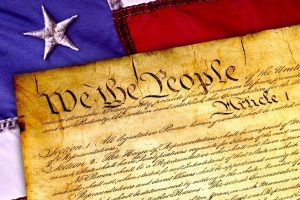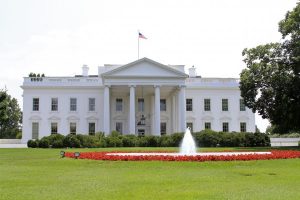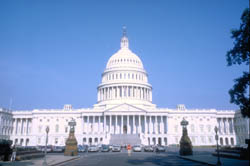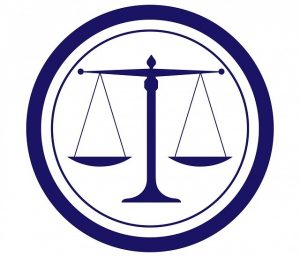If we feel sometimes like we’ve gone to law school over the past eight years, it’s understandable. For many of us who have been paying attention, we have learned more than we ever wanted or expected to know about our Constitution and legal system. This is not an entirely bad thing; we citizens should definitely know the basics of our system of government.
Let us count the ways! (There are so many that we will continue this discussion next time.)
Constitutional Amendments. Our Constitution is made up of a Preamble, seven articles and, at this time, 27 Amendments. Most of us have a passing acquaintance, at least, with the First Amendment, which concerns the freedoms of religion, speech and the press and the rights of assembly and petition. What we are learning more specifically, as the indictments rain down on the twice-impeached, one-term ex-President, Donald Trump, is that there are limits to free speech. These include items listed in some of his various indictments, such as incitement to violence or lawless action, defamation or defamatory lies, lying under oath, fraud (or deliberate misrepresentation of fact for the purpose of depriving someone of a valuable possession), fighting words, and threats.This makes sense, does it not?  How can a free society, especially one based on laws, allow us to function safely and with trust for each other and our institutions if these examples of free speech are allowed?
How can a free society, especially one based on laws, allow us to function safely and with trust for each other and our institutions if these examples of free speech are allowed?
The 14th Amendment is coming into sharper focus, as experts and a number of State officials throughout the country are examining Section 3: is Trump automatically ineligible to have his name even on ballots because of his presumed role in the January 6, 2021, insurrection at the Capitol?
The 25th Amendment received some attention at least twice during Trump’s time in office. The relevant clause, in Section 4, concerns the situation when the President becomes unable “to discharge the powers and duties of his office.” John Hudak of the Brookings Institution argued for the 25th to be invoked shortly after January 6th. Most notably to examine this possibility, perhaps, were members of Trump’s own cabinet – who, one can argue, were among the people who could most clearly see him in action close-up. One of the most stunning figures was probably John Kelly, not only one of Trump’s former Chiefs of Staff but also a highly-regarded retired US Marine Corps general. While the Democratic-led House voted on January 12, 2021, to urge VP Mike Pence to invoke the 25th to remove Trump from office, Pence declined – even though his life had been at risk at the Capitol only a few days earlier.
Laws versus norms. Much has been said over the past eight years about the myriad norms that Trump and his allies have transgressed. According to Dartmouth Professor Brendan Nyhan in 2017, these started early and range from directly attacking the press and refusing to hold a press conference for an unprecedented amount of time, and refusing to disentangle himself from his business interests, to violating the Hatch Act, refusing to concede his 2020 election loss, repeatedly claiming that he both declassified the documents he took to Mar-a-Lago after he left the White House and that there were other legitimate reasons to take them, attacking the independent judiciary and the independence of the Department of Justice, avoiding the Senate confirmation process in order to place his preferred individuals in key positions, repeatedly refusing to disclose his tax returns, frequently invoking federal emergency powers to pursue controversial political priorities (such as building the border wall), and removing inspectors general whom he did not like (since April 2020, affected agencies have included State, Defense, Transportation, Health and Human Services, and the intelligence community).  The Brookings Institution has offered remedies to these transgressions and more; there are many laws that need to be considered adding, changing or enhancing in order to prevent these egregious violations from ever happening to us again. Of course, the 91 charges that Trump now faces do help to hold him accountable to actual laws that he and his co-defendants and co-conspirators are accused of breaking.
The Brookings Institution has offered remedies to these transgressions and more; there are many laws that need to be considered adding, changing or enhancing in order to prevent these egregious violations from ever happening to us again. Of course, the 91 charges that Trump now faces do help to hold him accountable to actual laws that he and his co-defendants and co-conspirators are accused of breaking.
The art of pardoning. We have seen past Presidents offer questionable and controversial pardons to convicted persons in our history, so Americans know something of what presidential pardons are. What we are being reminded from the Trump era is the fact that the President can only pardon federal criminal offenses, not state crimes and not civil infractions. This is important because of the indictments against Trump handed down in Manhattan in April 2023 and in Georgia in August: if Trump or any others named are ultimately convicted in these actions, a federal pardon is out of the question. What we are learning perhaps anew is the extent of presidential pardons. As the Brookings Institution points out, pardons “are typically given after a person has been convicted of a crime, and they specifically reference that crime.” Therefore, broad, preemptive pardons that Trump has suggested are unlikely to be held as valid. In addition, perhaps most egregiously, Trump has reportedly hinted at pardoning himself. This is an unresolved legal issue (is it any wonder that our Founding Fathers felt that it would be nearly unthinkable to even consider the need for this situation to be addressed in the Constitution?) At least one Republican candidate running in the 2024 primary cycle, former Texas Congressman Will Hurd, has stated publicly – to boos – that Trump is “running for president not to represent voters, but to ‘stay out of prison.’”
A most important date. How many Americans knew the significance of January 6 before 2021? According to the Electoral Count Act of 1887, January 6 is the day – every four years – that Congress must convene to open sealed certificates from each state that record their electoral votes. The votes are physically brought into the chamber, then bipartisan representatives of both chambers read out the results and do an official count. The president of the Senate, always the Vice President of the US, presides over the session in a purely ceremonial role and declares the winner. (The VP’s ceremonial role has now been more specifically codified by the Electoral Count Reform and Presidential Transition Improvement Act of 2022.) Trump obviously knew the significance of January 6 at some point: as early as mid-December 2020, Trump was pressuring Pence to overstep his ceremonial role and declare Trump the winner of the election.
The three branches of government. Under our Constitution – Articles I through III – our government is comprised of three separate branches: the legislative (Senate and House); the executive (President and Vice President); and the judiciary (not only the Supreme Court but also “such inferior Courts as the Congress may from time to time ordain and establish”). Trump has attempted to circumvent this separation, especially when it comes to the courts. Trump as the Executive had no jurisdiction over the courts under the Constitution. Fortunately for our democracy, several courts throughout the country did their job and overturned Trump’s 60+ lawsuits that he filed in attempts to unlawfully retake the White House after his 2020 election loss. (Significantly, the Washington Post found that “38 judges appointed by Republicans were among the 86 judges who had rejected [Trump’s] lawsuits.”) However, the separation of the branches does not matter to Trump or many of his supporters, some of them violent. Trump has a long history of attacking judges who have adjudicated against him, and his anti-judge rhetoric has resulted in direct threats to the lives and safety of a number of judges and their families. Trump’s attacks and actions might legitimately be considered “weaponization” of the courts; of course, as can be expected, “weaponization,” especially of the entire federal government, is now a watchword of the Republican House majority.
The absence of ethics guidelines on the Supreme Court. Speaking of the courts, we American citizens are learning an important civics lesson about the lack of ethical guardrails on Supreme Court justices. As Reuters reported in July 2023, “Unlike other members of the federal judiciary, the Supreme Court’s nine life-tenured justices have no binding ethics code of conduct.” In addition, justices decide themselves whether to recuse – which means that they can help decide a vital case without revealing to the American public that they have had contact with someone involved in that case. Thanks to reporting by the outlet ProPublica, we have learned that several justices have even failed to do the basic minimum required of them: reporting outside income and certain gifts. The case of Justice Clarence Thomas, one of the six extremely conservative justices, was first reported in April 2023. At the very least, according to Vox.com, Thomas “has accepted luxury trips from a major Republican donor [billionaire Harlan Crow] – and failed to disclose them – for over two decades…. The degree to which Thomas utilized Crow’s gifts is believed to be uncommon. ‘This is beyond anything that I’ve ever seen across any branch of government,’” according to Virginia Canter, chief ethics counsel at the Citizens for Responsibility and Ethics (CREW) in Washington.  A bill proposed to tighten ethics oversight of the Supreme Court has met with a level of rancor from elected GOP officials that perhaps would not be so vociferous had it not been for Donald Trump. His friend Senator Lindsey Graham (R-SC), for instance, stated that the bill’s purpose was “to destroy a conservative court.” Republicans have been unified in arguing that Supreme Court Justices should police themselves, but that is a very weak argument given that “justices have spent years considering ‘an internal plan’ for the court’s first-ever code of conduct, but those efforts have ‘stalled’ due to deep divisions among the justices themselves.” According to the Constitution, Congress has the right, if not the responsibility, to regulate Supreme Court ethics.
A bill proposed to tighten ethics oversight of the Supreme Court has met with a level of rancor from elected GOP officials that perhaps would not be so vociferous had it not been for Donald Trump. His friend Senator Lindsey Graham (R-SC), for instance, stated that the bill’s purpose was “to destroy a conservative court.” Republicans have been unified in arguing that Supreme Court Justices should police themselves, but that is a very weak argument given that “justices have spent years considering ‘an internal plan’ for the court’s first-ever code of conduct, but those efforts have ‘stalled’ due to deep divisions among the justices themselves.” According to the Constitution, Congress has the right, if not the responsibility, to regulate Supreme Court ethics.
This is our first look at how the Trump era is helping to educate us about how our government works – or how it has worked in the past or how it should work. We will continue our education next time.
